
Porcelain Slab Tile for Wall Supplier: Cost Guide for Residential & Commercial Projects

Walls are more than just structural dividers—they're the canvas that sets the mood of a space. Whether you're designing a cozy home kitchen, a sleek office lobby, or a luxurious hotel suite, the materials you choose for your walls play a starring role in both aesthetics and functionality. In recent years, porcelain slab tiles have emerged as a top choice for wall cladding, beloved for their durability, versatility, and stunning visual appeal. But as any project manager, homeowner, or contractor knows, understanding the costs involved is key to staying on budget. That's where a trusted porcelain slab tile for wall supplier comes in—guiding you through options, balancing quality with affordability, and ensuring your project runs smoothly from concept to completion. In this guide, we'll break down everything you need to know about the costs of porcelain slab tiles for walls, tailored to both residential and commercial projects, and share insights to help you partner with the right supplier.
What Are Porcelain Slab Tiles, Anyway?
Let's start with the basics: What makes porcelain slab tiles different from your average wall tile? Think of them as the premium cousins of ceramic tiles—crafted from a blend of refined clay, feldspar, and other natural minerals, then fired at extremely high temperatures (up to 1,200°C). This intense heat transforms the material into something remarkably dense, non-porous, and tough. Unlike traditional ceramic tiles, which can be porous and prone to chipping, porcelain slabs are built to withstand the test of time.
One of the biggest draws? Their size. Porcelain slabs typically range from 1200x2400mm to massive 1600x3200mm sheets, though smaller sizes (like 600x1200mm) are also available for more intricate designs. Thickness varies too—6mm slabs are lightweight and ideal for vertical applications like walls, while 12mm or 20mm options offer extra durability for high-traffic areas. Finishes run the gamut: polished (for a glossy, mirror-like shine), matte (sleek and modern), textured (for added grip or rustic charm), or even wood-look or stone-look, thanks to advanced digital printing technology that mimics natural materials with stunning accuracy.
In short, porcelain slab tiles are more than just wall coverings—they're design statements that marry beauty with brawn. And as a porcelain slab tile for wall supplier, we often hear clients say the same thing: "I wish I'd chosen these sooner."
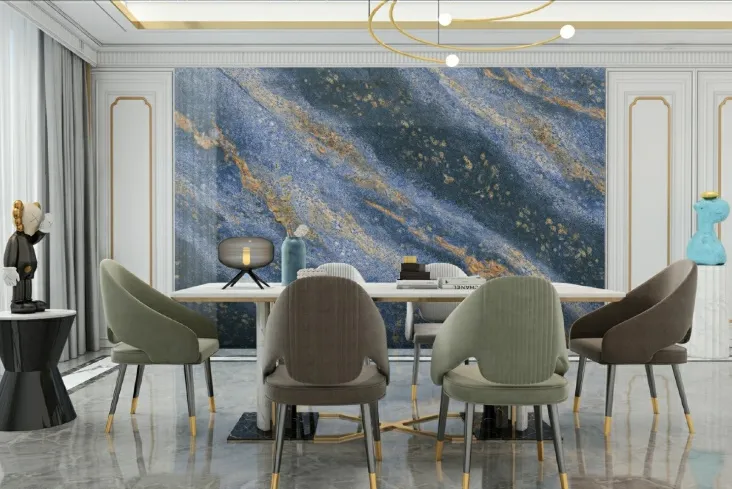
Why Porcelain Slab Tiles Are a Smart Investment for Walls
Before diving into costs, let's talk about why these tiles are worth considering. After all, understanding their benefits helps put the price tag in perspective. Here's why homeowners, architects, and developers keep coming back to porcelain slab tile solutions:
Durability that lasts decades: Porcelain is resistant to scratches, stains, and impacts—perfect for busy family homes or high-traffic commercial spaces like restaurants or retail stores. Spills? Wipe them up. Kids scribbling with markers? A quick clean with a mild detergent does the trick. Unlike paint or wallpaper, which fades or peels over time, porcelain slabs maintain their looks for years, making them a long-term investment.
Low maintenance, high reward: No sealing required! Because porcelain is non-porous, it doesn't absorb moisture, mold, or mildew—ideal for bathrooms, kitchens, or humid climates (we're looking at you, Saudi Arabia). A simple wipe-down with water is usually all it takes to keep them sparkling. For commercial clients, this translates to lower upkeep costs over the life of the building.
Fire resistance for peace of mind: Safety first, especially in commercial projects like hospitals or schools. Porcelain slab tiles are inherently fire-resistant, with many options meeting Class A fire ratings. This compliance not only keeps occupants safe but also helps projects meet strict building codes—a must for any commercial building materials supplier.
Design flexibility: With digital printing, the design possibilities are endless. Want your wall to look like Italian marble? Done. Prefer the warmth of reclaimed wood? No problem. Porcelain slabs can mimic rare stones, metals, concrete, or even abstract patterns, giving you the freedom to create a truly unique space. And because they're available in large formats, you can minimize grout lines for a seamless, high-end look that's hard to achieve with smaller tiles.
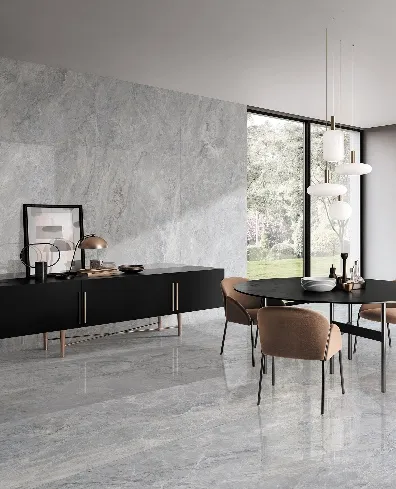
Factors That Influence Porcelain Slab Tile Costs
Now, let's get to the heart of the matter: cost. The price of porcelain slab tiles for walls isn't one-size-fits-all—it depends on a mix of factors, from the tile itself to your project's specific needs. Here's what drives the numbers:
Material quality: Not all porcelain slabs are created equal. Premium options use finer clays and more precise manufacturing processes, resulting in fewer imperfections and richer colors. These top-tier tiles can cost 30-50% more than standard varieties, but the difference in durability and aesthetics is noticeable. As a residential building materials supplier, we often advise homeowners that investing in higher quality pays off in the long run, especially for focal walls.
Size and thickness: Larger slabs mean higher material costs—think of it as buying a king-size bed vs. a twin. A 1600x3200mm slab requires more raw materials and careful handling during production (one small flaw can ruin the entire tile), so suppliers price them accordingly. Thickness matters too: a 12mm slab is sturdier than a 6mm one but costs more per square meter. That said, larger slabs cover more area with fewer tiles, which can offset some costs in installation (fewer cuts, less labor).
Finish and customization: Basic finishes like matte or polished are the most affordable. Specialty finishes—think metallic glazes, 3D textures, or custom digital prints—add to the price tag. For example, a slab mimicking a rare Swiss stone might cost $120 per sqm, while a standard white polished slab could be $50 per sqm. If you're set on a unique look, expect to budget extra.
Quantity and order size: Commercial projects often benefit from bulk discounts. A hotel chain ordering 10,000 sqm of tiles will pay less per sqm than a homeowner ordering 50 sqm for a bathroom. As a commercial building materials supplier, we work with developers to negotiate volume pricing, helping them stay within budget while maintaining quality.
Supplier type: Choosing between a specialized porcelain slab tile for wall supplier and a one-stop architectural solution provider can impact costs. A one-stop provider offers more than just tiles—they might bundle in adhesives, grouts, delivery, and even installation support, streamlining the process and reducing the need to coordinate with multiple vendors. While upfront costs might be similar, the time and stress saved often make one-stop solutions worth it, especially for large projects.
Installation complexity: Tiles don't install themselves! Labor costs depend on factors like wall condition (uneven walls require more prep work), tile size (larger slabs need experienced installers to avoid breakage), and project location (remote sites or high-rise buildings may charge extra for access). For example, installing a 1200x2400mm slab on a 10th-floor hotel lobby wall will cost more in labor than tiling a ground-floor residential bathroom.
Location and shipping: If you're sourcing tiles from overseas, shipping fees, import taxes, and transit times can add up. Local suppliers—like a Saudi Arabia building materials supplier—often have lower delivery costs and faster lead times, which is crucial for keeping projects on schedule. Climate can also play a role: in regions with extreme temperatures, suppliers may stock specialized tiles resistant to thermal expansion, which can affect pricing.
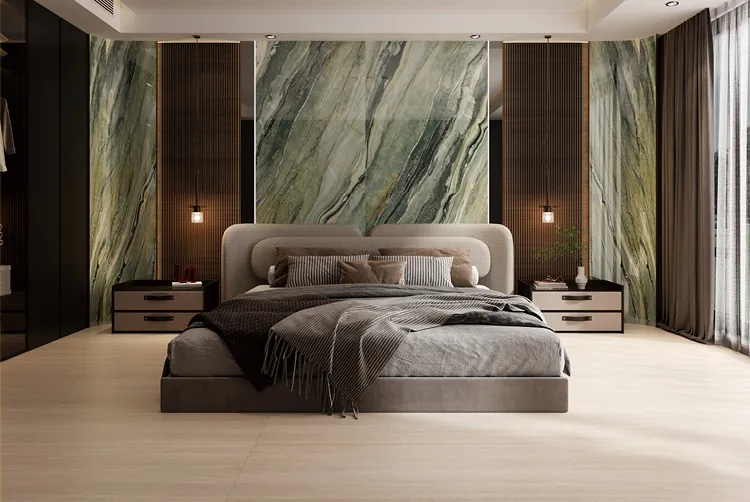
Residential vs. Commercial Costs: A Detailed Breakdown
To give you a clearer picture, let's compare average costs for residential and commercial projects. Remember, these are estimates—actual prices will vary based on the factors above, your location, and the supplier you choose. Always request a detailed quote from your porcelain slab tile for wall supplier to get accurate numbers.
| Project Type | Material Cost (per sqm) | Installation Cost (per sqm) | Total Cost (per sqm) | Key Considerations |
|---|---|---|---|---|
| Residential: Basic (e.g., bathroom walls) | $50 – $90 | $30 – $50 | $80 – $140 | Smaller slabs (600x1200mm), standard finishes, minimal prep work. |
| Residential: Mid-Range (e.g., kitchen backsplash) | $90 – $150 | $40 – $70 | $130 – $220 | Larger slabs (1200x2400mm), premium finishes (e.g., wood-look), custom cuts for outlets. |
| Residential: Luxury (e.g., living room accent wall) | $150 – $300+ | $60 – $100 | $210 – $400+ | Extra-large slabs (1600x3200mm), rare stone or metal finishes, intricate designs (e.g., curved walls). |
| Commercial: Basic (e.g., office break room) | $40 – $80 | $25 – $45 | $65 – $125 | Bulk orders, standard colors, simple layouts, minimal customization. |
| Commercial: Mid-Range (e.g., retail storefront) | $80 – $130 | $35 – $60 | $115 – $190 | Large-format slabs, branded finishes (e.g., company colors), fire-rated options. |
| Commercial: Luxury (e.g., hotel lobby) | $130 – $250+ | $50 – $90 | $180 – $340+ | Custom designs, high-end finishes (e.g., marble-look), integration with lighting or signage. |
Residential deep dive: Let's say you're a homeowner in Riyadh, Saudi Arabia, renovating your kitchen. You want a 1200x2400mm wood-look porcelain slab backsplash (mid-range) covering 8 sqm. Material cost: ~$120/sqm x 8 = $960. Installation: ~$55/sqm x 8 = $440. Waste factor (10% extra for cuts/breakage): $96. Total: ~$1,496. Not bad for a focal point that will elevate your kitchen for years.
Commercial deep dive: A hotel in Jeddah needs to tile 500 sqm of lobby walls with 1600x3200mm polished marble-look slabs (mid-range commercial). Material cost: $100/sqm x 500 = $50,000 (bulk discount applied). Installation: $45/sqm x 500 = $22,500. Waste factor (8% for commercial, as installers are more experienced): $4,000. Total: ~$76,500. For a space that welcomes thousands of guests annually, this investment in durability and aesthetics is a no-brainer.
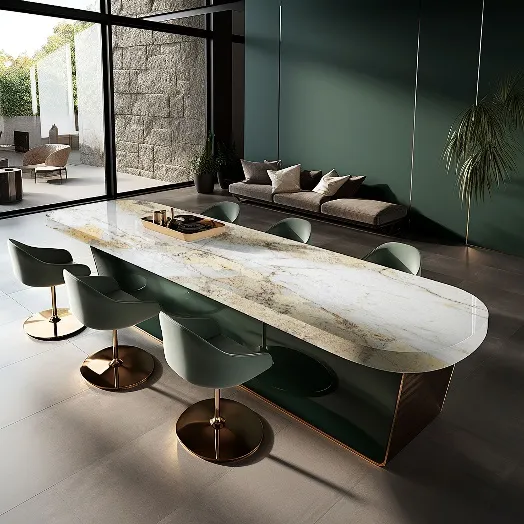
How to Choose the Right Porcelain Slab Tile Supplier
Cost is important, but so is choosing a supplier you can trust. Here's what to look for:
Product quality and certifications: Ask for samples and check for consistency in color, thickness, and finish. Reputable suppliers will have certifications like ISO 9001 (quality management) or CE marking (for European standards). For commercial projects, verify fire ratings (e.g., Class A) and moisture resistance test results.
Range of solutions: Do they offer more than just tiles? A one-stop architectural solution provider should have access to complementary products like adhesives, grouts, and trim pieces, ensuring compatibility and reducing headaches. For example, if you're installing porcelain slabs in a bathroom, they should recommend water-resistant adhesives specifically designed for the job.
Experience in your project type: A supplier specializing in residential renovations may not have the expertise to handle a large commercial project, and vice versa. Look for a track record—ask for case studies or references from similar projects (e.g., "Can you share examples of hotels you've supplied with porcelain wall tiles?").
Customer service and support: From initial to post-installation, good communication is key. Will they help you calculate material quantities? Offer design advice? Provide after-sales support if tiles arrive damaged? A supplier who goes the extra mile can make a big difference in your project's success.
Transparent pricing: Avoid suppliers who give vague quotes. A detailed breakdown should include material costs, delivery fees, taxes, and any additional charges (e.g., custom cutting). If something seems too good to be true, it probably is—cheap tiles may be prone to cracking or fading, costing you more in the long run.
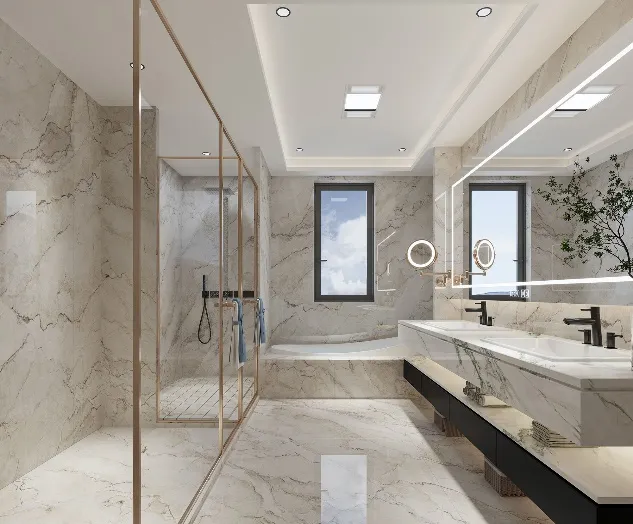
Common Mistakes to Avoid When Budgeting
Even with careful planning, budget overruns happen. Here are pitfalls to steer clear of:
Forgetting the waste factor: Tiles get cut, chipped, or damaged during installation. Always add 10-15% to your material order (8-10% for commercial projects with experienced installers). Running out of tiles mid-project means delays and potential color mismatches if you have to reorder.
Underestimating installation costs: Skimping on labor to save money can backfire. Inexperienced installers may crack slabs, leading to costly replacements. Invest in skilled professionals—ask for proof of training or certifications in large-format tile installation.
Ignoring delivery and storage fees: Large slabs require specialized delivery (e.g., flatbed trucks, forklifts). If your site doesn't have easy access, you may face extra charges. Also, storing tiles on-site? Make sure you have a dry, secure space—moisture or heavy objects stacked on tiles can cause damage.
Choosing based solely on price: A $30/sqm tile might seem like a steal, but if it fades in a year or cracks under minimal pressure, you'll end up replacing it sooner. Balance cost with quality—remember, porcelain slab tiles are a long-term investment.
Future Trends in Porcelain Slab Tile Solutions
As technology advances, so do porcelain slab tiles. Here's what we're seeing on the horizon that could impact costs and options:
Even larger slabs: Manufacturers are pushing the limits with 1800x3600mm and 2000x4000mm slabs, offering even more seamless wall designs. While these will initially cost more, as production scales, prices are likely to become more accessible.
Eco-friendly options: Sustainability is a growing concern, and suppliers are responding with tiles made from recycled materials or produced using energy-efficient processes. Expect to see more "green" certifications, which may add a small premium but appeal to eco-conscious clients.
Smart integration: Imagine tiles embedded with LED lighting or sensors that adjust color based on time of day. While still niche, these high-tech solutions are emerging in luxury commercial projects and could become more mainstream as costs decrease.
Final Thoughts: Investing in Quality, Partnering for Success
Porcelain slab tiles for walls offer a winning combination of beauty, durability, and versatility, making them a top choice for both residential and commercial projects. While costs vary based on size, finish, quantity, and supplier, the key is to balance your budget with long-term value. Remember, the cheapest option today might cost you more tomorrow in repairs or replacements.
Choosing the right porcelain slab tile for wall supplier is just as important as choosing the tiles themselves. Whether you opt for a specialized supplier or a one-stop architectural solution provider, look for experience, transparency, and a commitment to quality. With the right partner, your wall cladding project will not only meet your budget but exceed your design expectations—creating a space that wows for years to come.
Ready to start your project? Reach out to a trusted supplier today, armed with the insights from this guide, and take the first step toward walls that are as functional as they are stunning.
Tags:
Recommend Products










